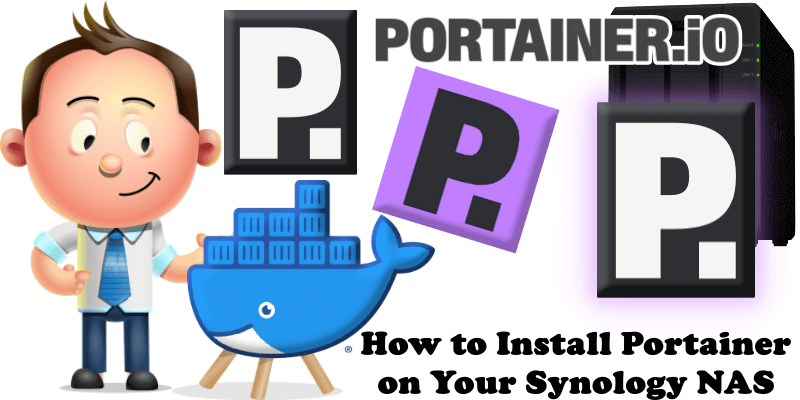
Do you want to install Portainer via Docker without a terminal? Are you tired of complicated guides? Do you want something quick and easy? Well today I will teach you how to install the latest Portainer 2.33.7 CE on your Synology NAS in less than 30 seconds directly through the Task Scheduler option. It’ll be over in a couple of seconds and it’s essentially child’s play. Portainer is a lightweight management UI which allows you to easily manage your Docker host or Swarm cluster. Portainer is meant to be as simple to deploy as it is to use. It consists of a single container that can run on any Docker engine (Docker for Linux, Docker for Synology DSM and Docker for Windows are all supported). Portainer allows you to manage your Docker stacks, containers, images, volumes, networks and more! It is compatible with the standalone Docker engine and with Docker Swarm.
This guide works perfectly with the latest Portainer CE 2.33.7 release.
STEP 1
Please Support My work by Making a Donation.
STEP 2
Install Container Manager via Synology “Package Center”. If you run an older DSM version (under 7.2), search for Docker instead of Container Manager.
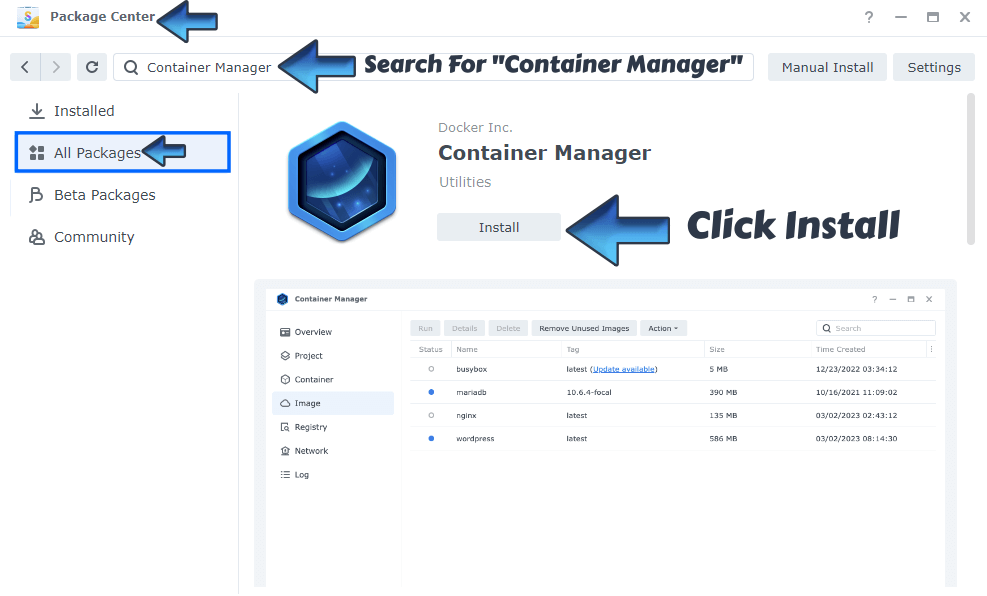
STEP 3
Go to File Station and open the docker folder. Inside the docker folder, create a new folder and name it portainer. Follow the instructions in the image below.
Note: Be careful to use only lowercase, not uppercase letters.
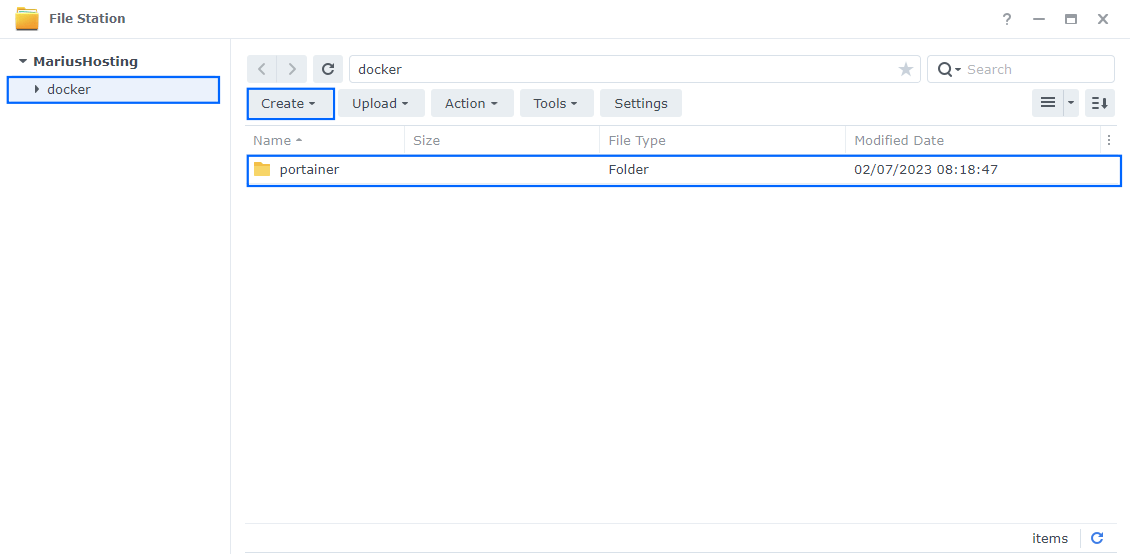
STEP 4
Go to Control Panel / Task Scheduler / Create / Scheduled Task / User-defined script. Follow the instructions in the image below.
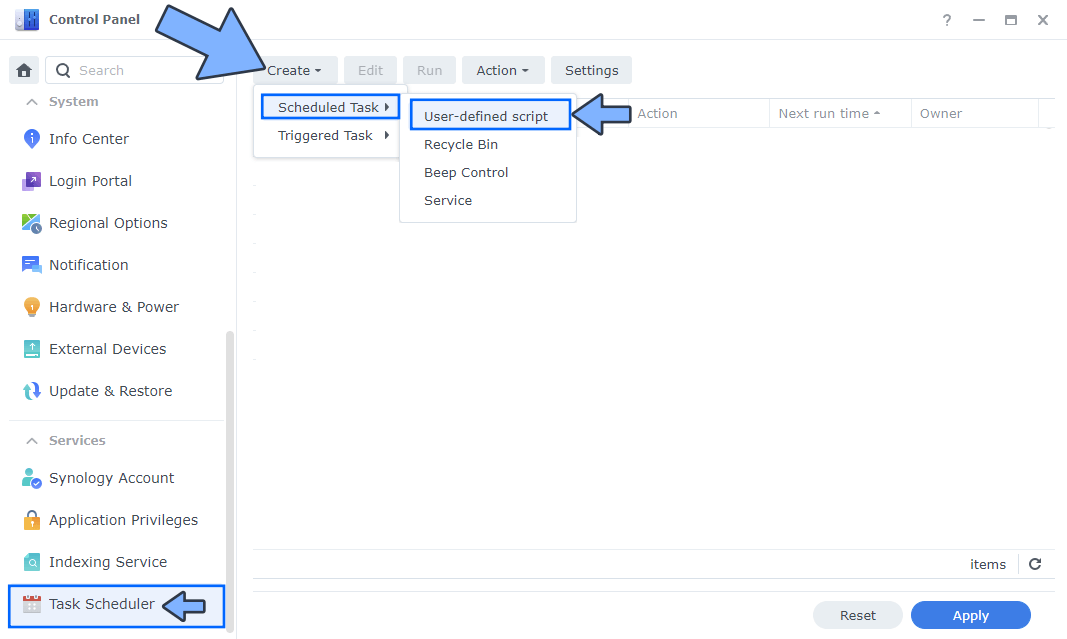
STEP 5
Once you click on User-defined script, a new window will open. Follow the instructions below:
- General: In the Task field type in “Install Portainer“. Uncheck the “Enabled” option. Select root User.
- Schedule: Select Run on the following date then select “Do not repeat“.
- Task Settings: Check “Send run details by email“, add your email, then copy paste the code below in the Run command area. After that, click OK.
docker run -d --name=portainer \ -p 8000:8000 \ -p 9000:9000 \ -v /var/run/docker.sock:/var/run/docker.sock \ -v /volume1/docker/portainer:/data \ --restart=always \ portainer/portainer-ce
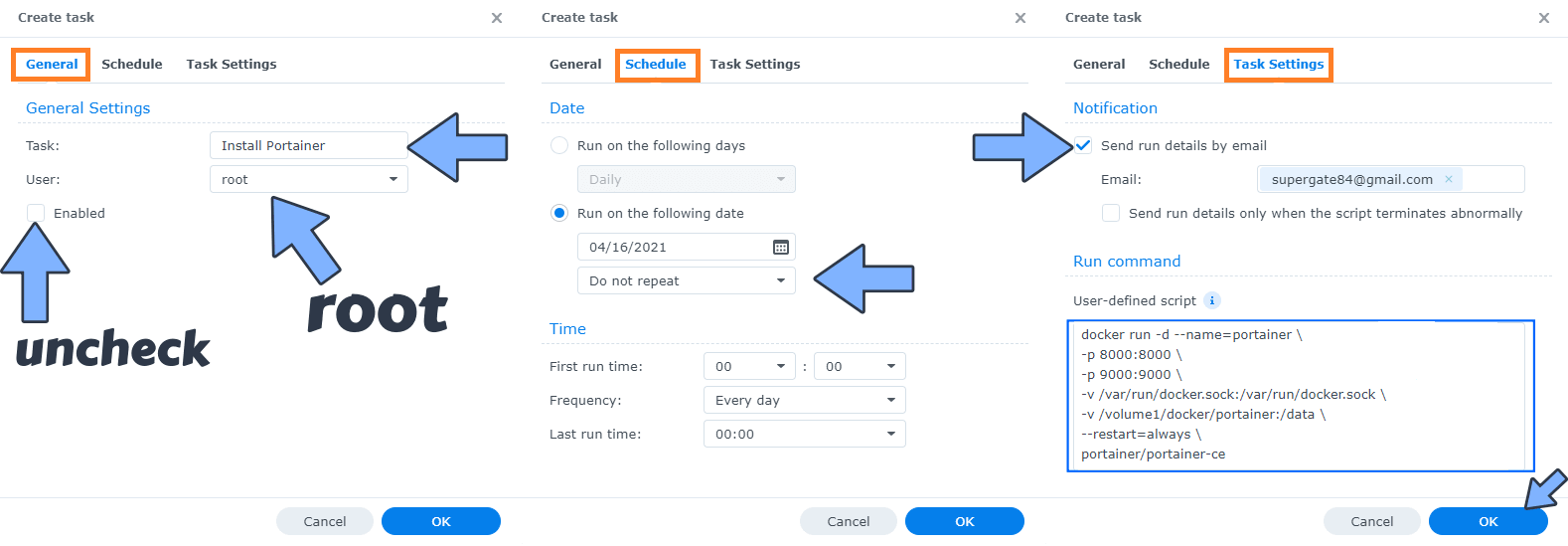
STEP 6
After you click OK on STEP 5, a new warning pop up window will open. Click OK.
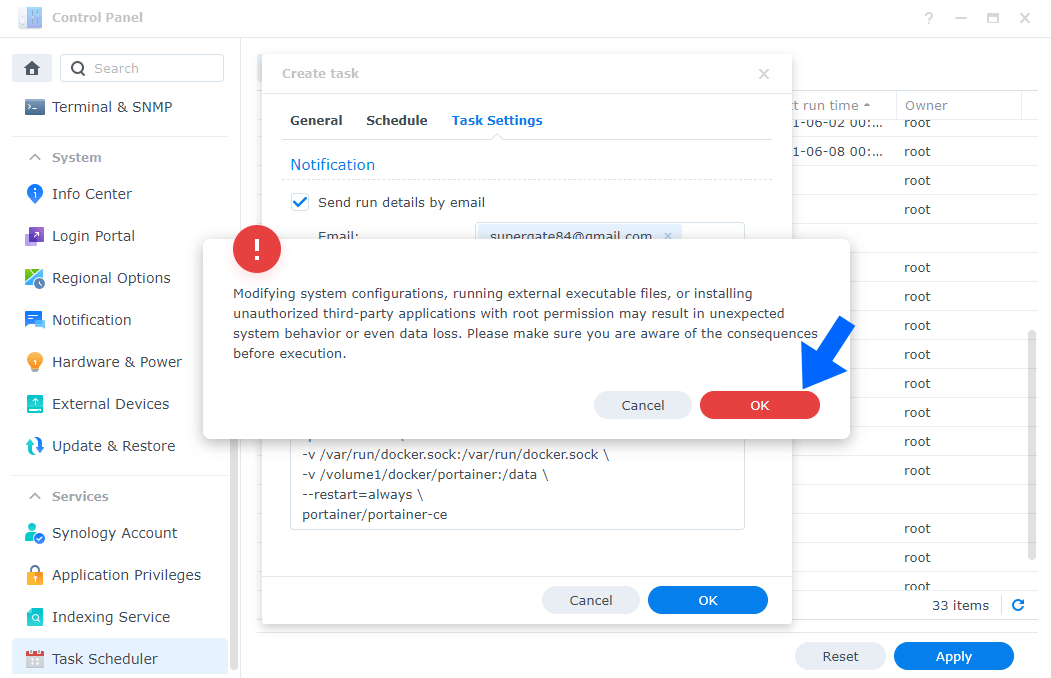
After you click OK, type in your DSM Password then click Submit. Follow the instructions in the image below.
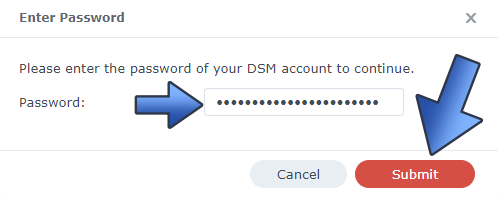
STEP 7
After you click Submit at STEP 6, select your “Install Portainer” Task, then click the “Run” tab. You will be asked to run Install Portainer – click OK. Follow the instructions in the image below.
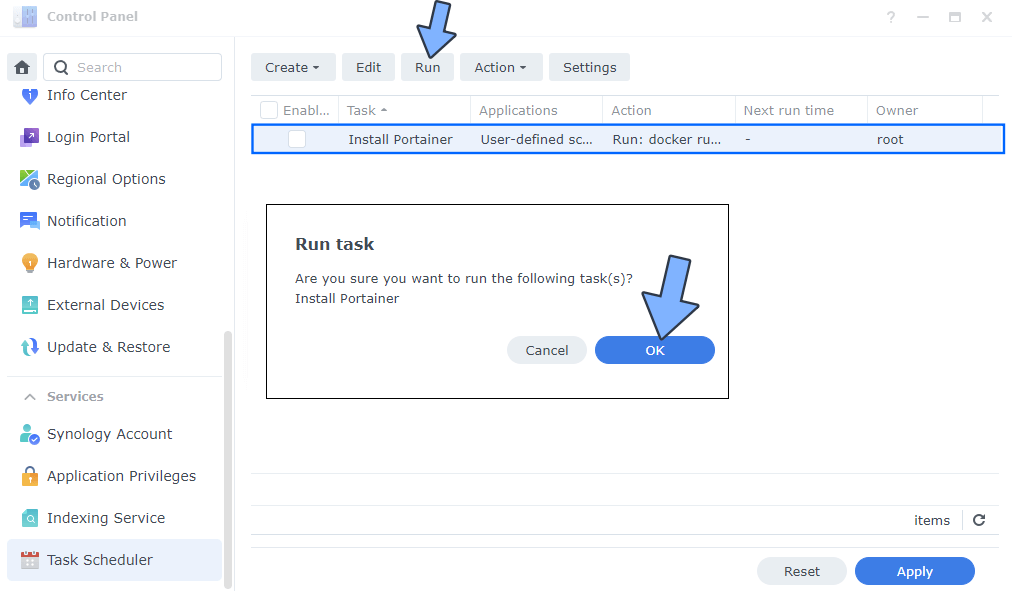
STEP 8
🟢Please Support My work by Making a Donation. Almost 99,9% of the people that install something using my guides forget to support my work, or just ignore STEP 1. I’ve been very honest about this aspect of my work since the beginning: I don’t run any ADS, I don’t require subscriptions, paid or otherwise, I don’t collect IPs, emails, and I don’t have any referral links from Amazon or other merchants. I also don’t have any POP-UPs or COOKIES. I have repeatedly been told over the years how much I have contributed to the community. It’s something I love doing and have been honest about my passion since the beginning. But I also Need The Community to Support me Back to be able to continue doing this work.
STEP 9
The installation process can take up to a few seconds/minutes. It will depend on your Internet speed connection. Open your browser and type in http://Synology-ip-address:9000 Choose a Username and a strong Password, confirm the password, then press Create user. Follow the instructions in the image below.
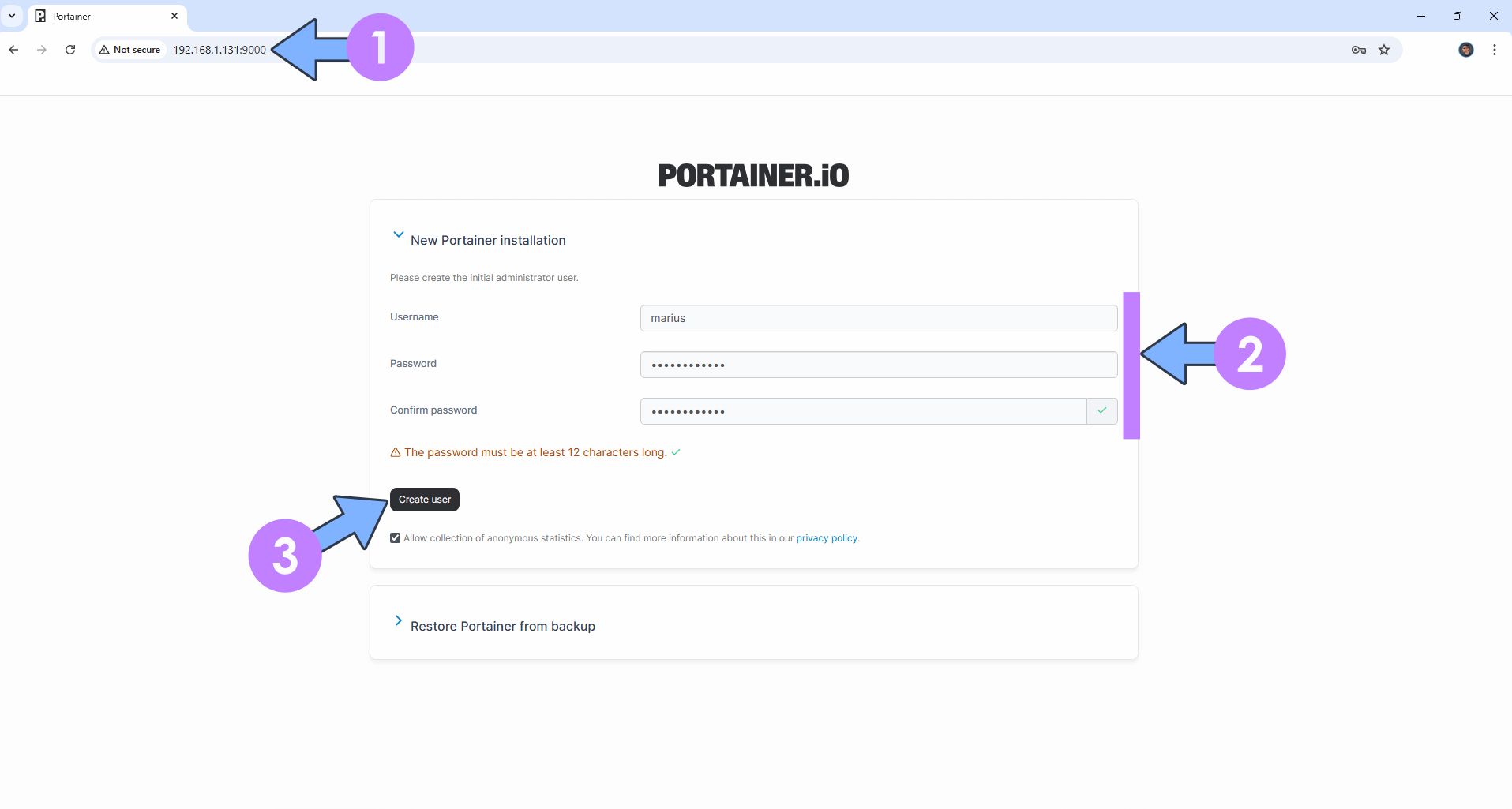
STEP 10
Click Get Started (proceed using the local environment in which Portainer is running in). Follow the instructions in the image below.
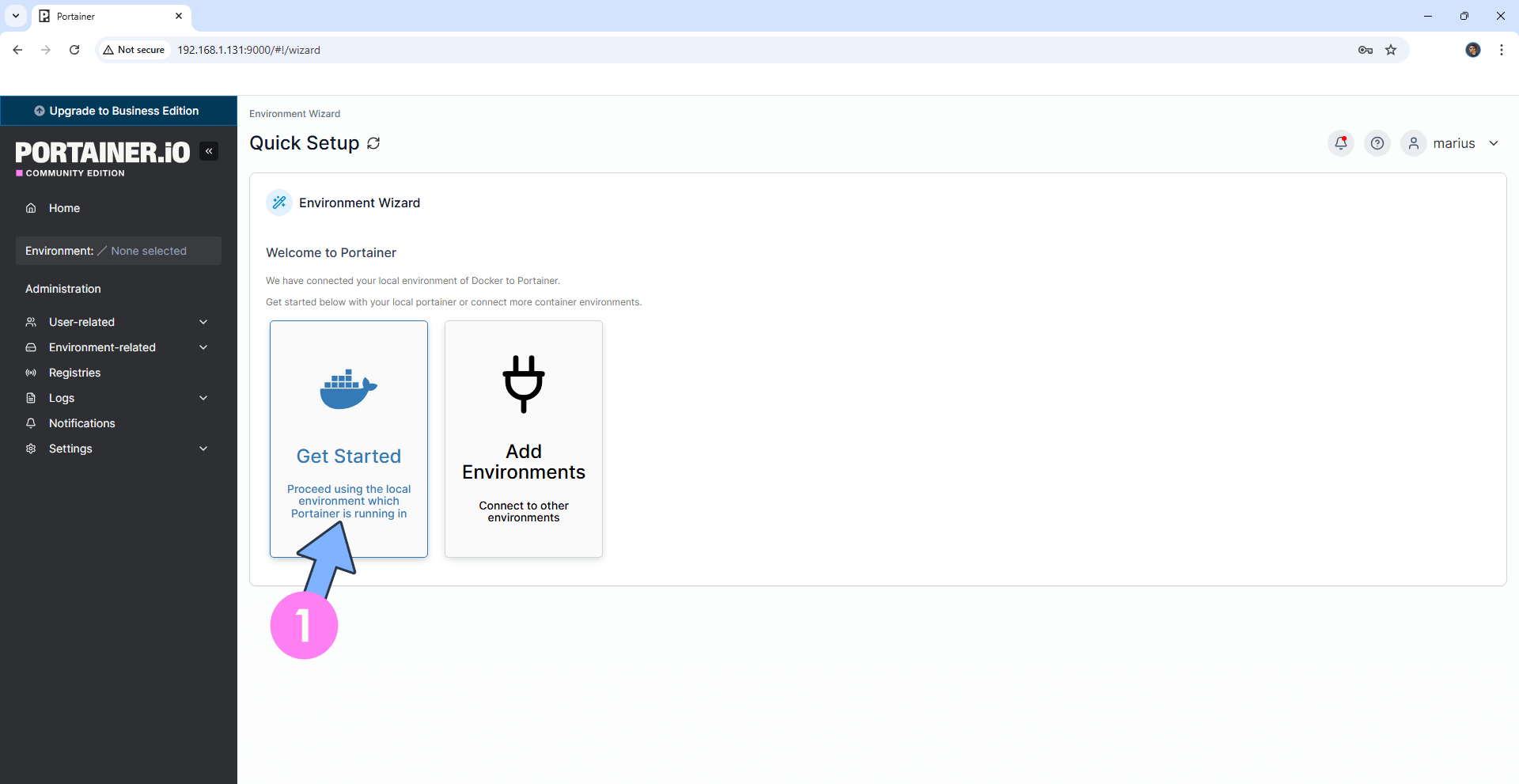
STEP 11
On the right in the Environments are, click on the little pencil icon. Follow the instructions in the image below.
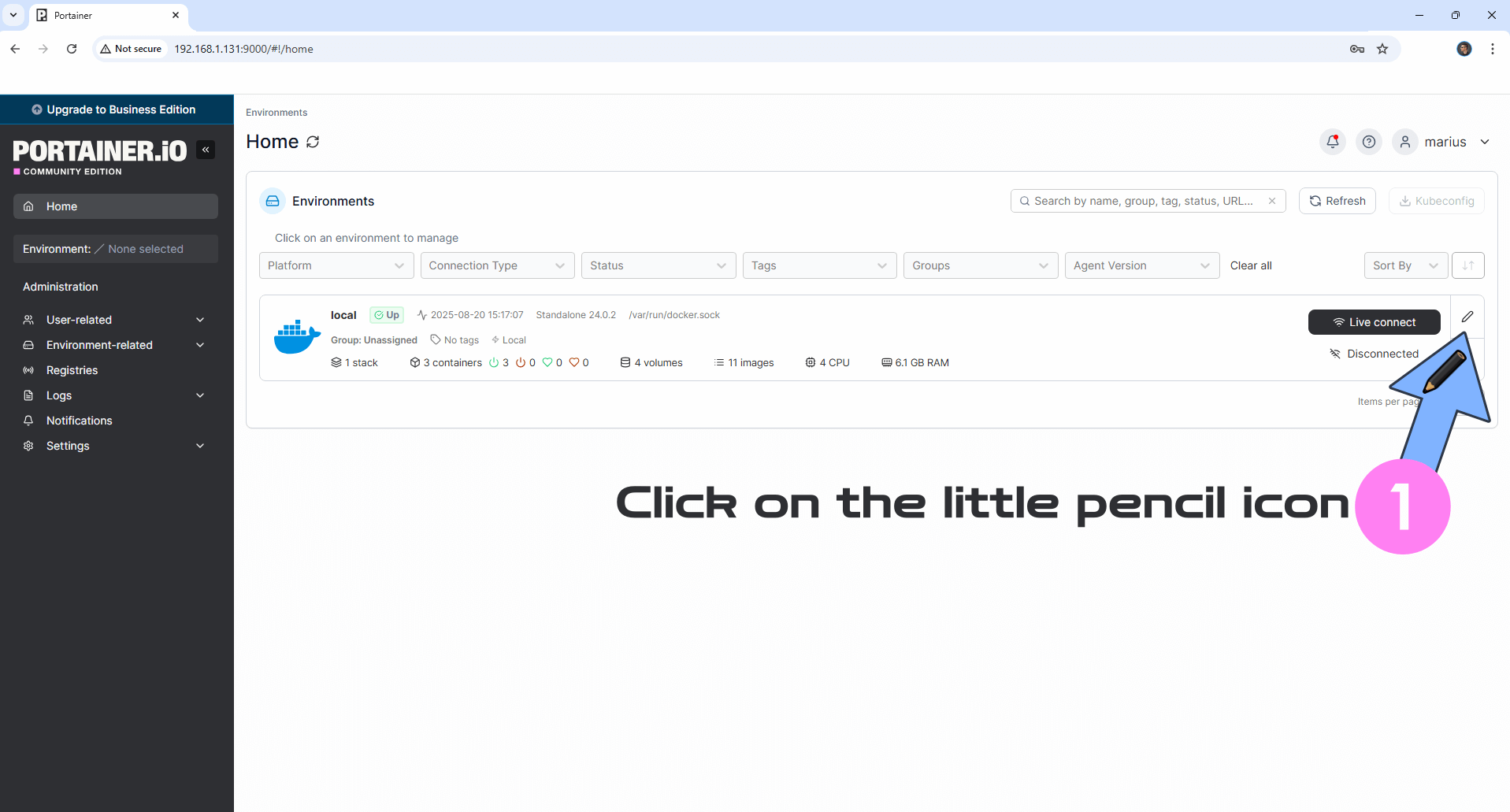
STEP 12
After you click on the little pencil icon, a new page will open. On the Public IP area, type in your own NAS Local IP which, in my case, is 192.168.1.131 then click Update environment. Follow the instructions in the image below.
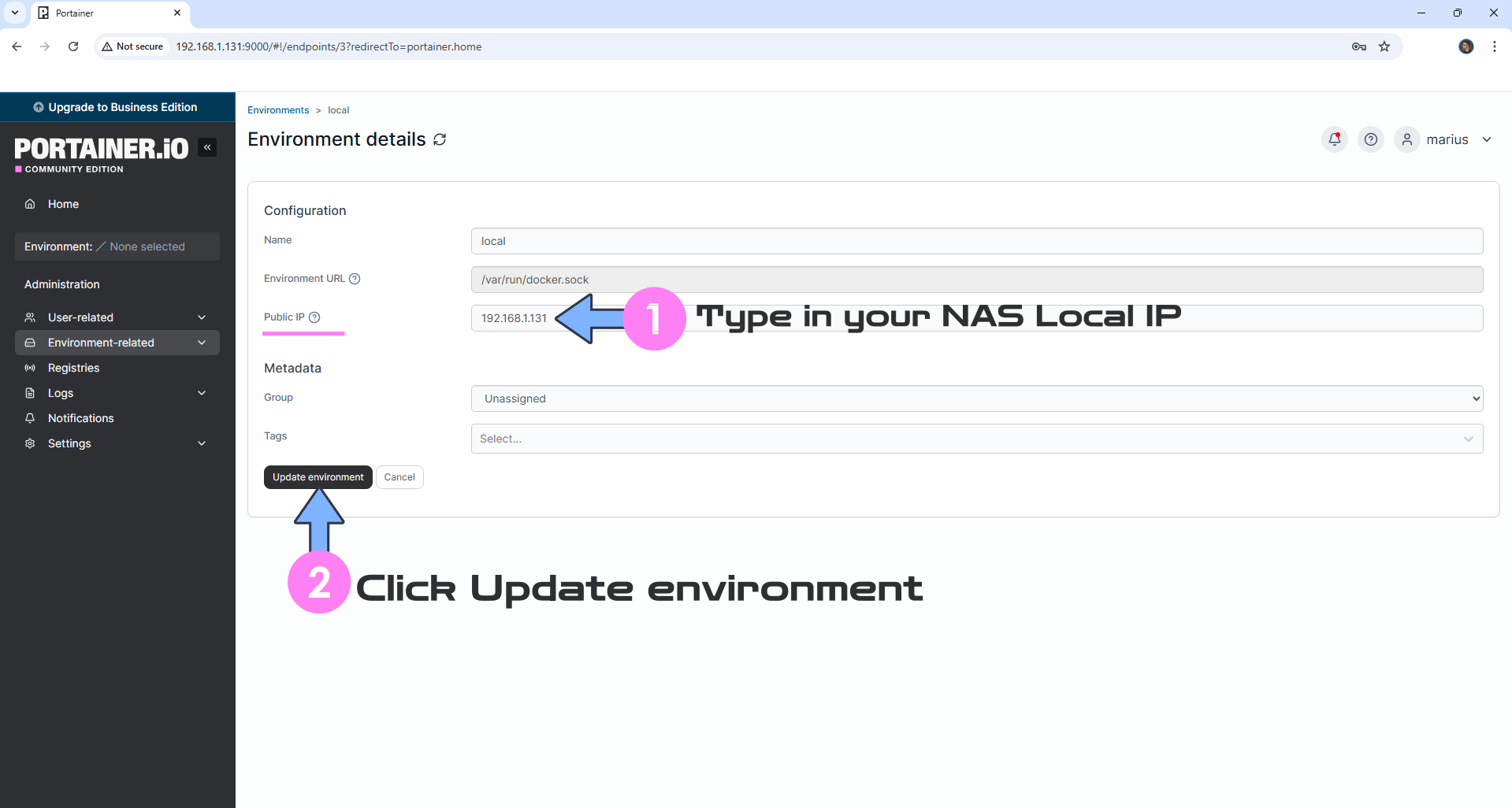
STEP 13
If everything goes right, you will see this message at the top right of your screen: “Environment updated“. Go straight to the next STEP.
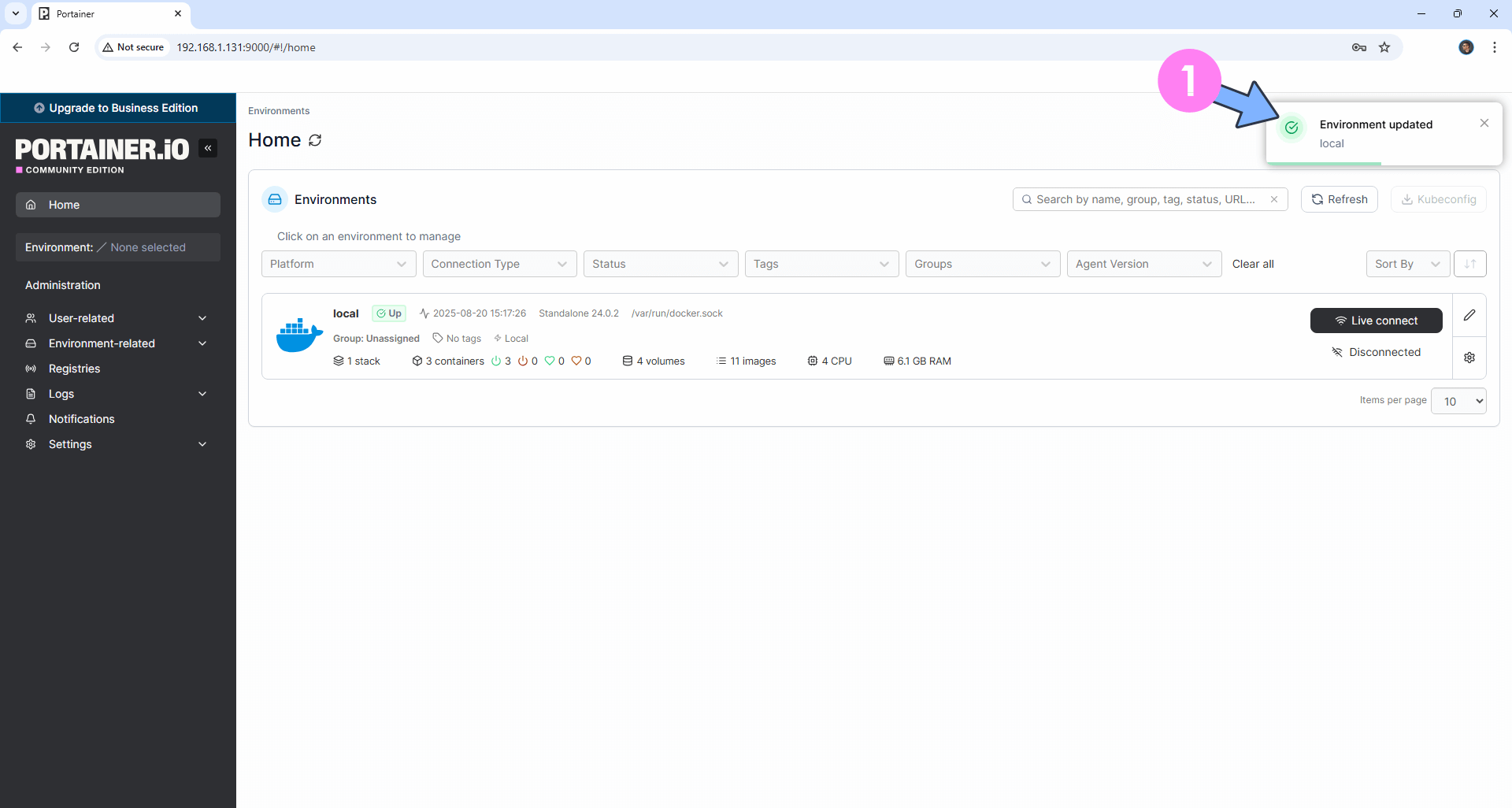
STEP 14
Click Live connect. Follow the instructions in the image below.
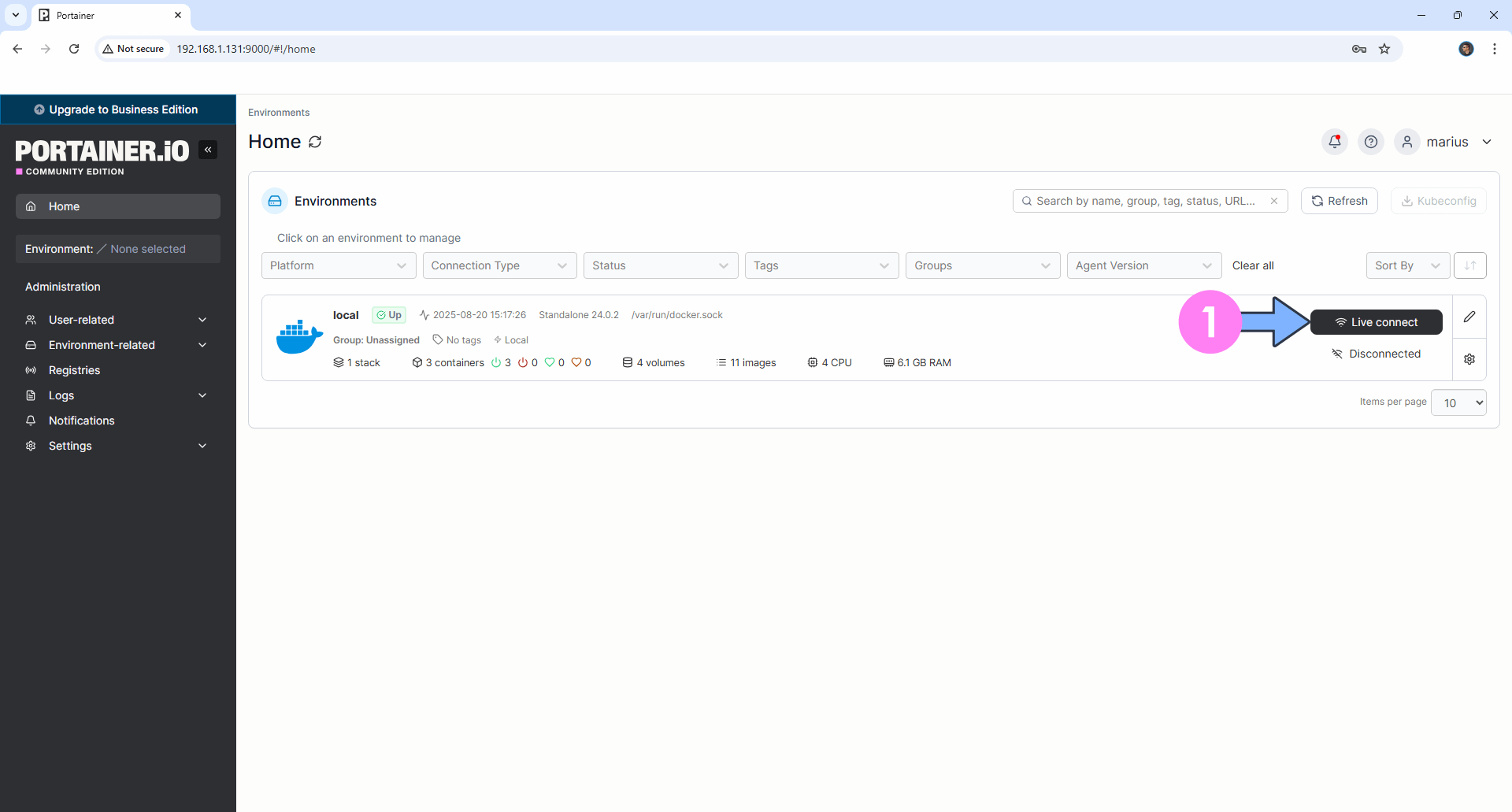
STEP 15
Your Dashboard will look like this. Go straight to the next STEP.
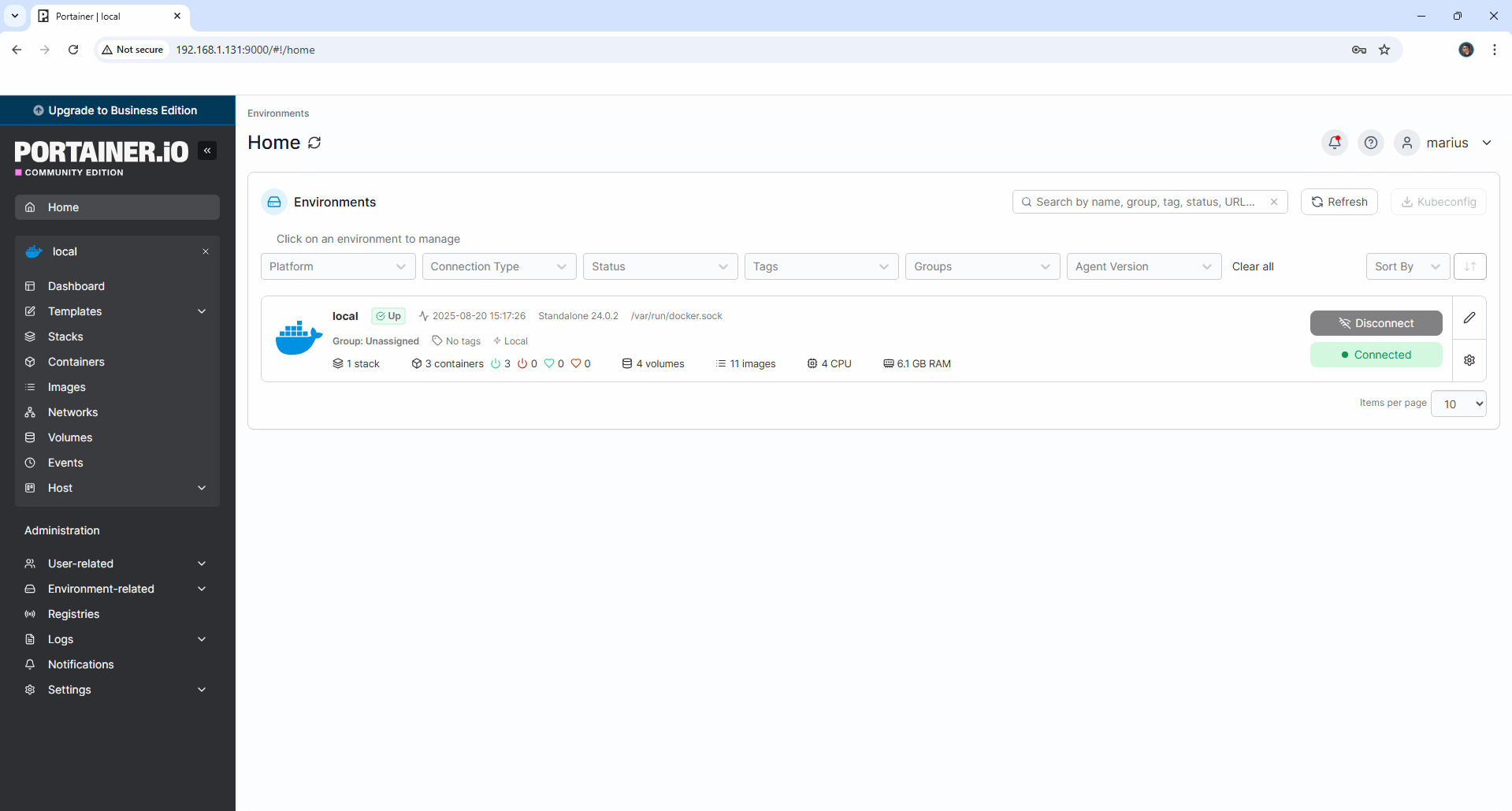
STEP 16
On the left Portainer sidebar, click on Registries then Click + Add registry. Follow the instructions in the image below.
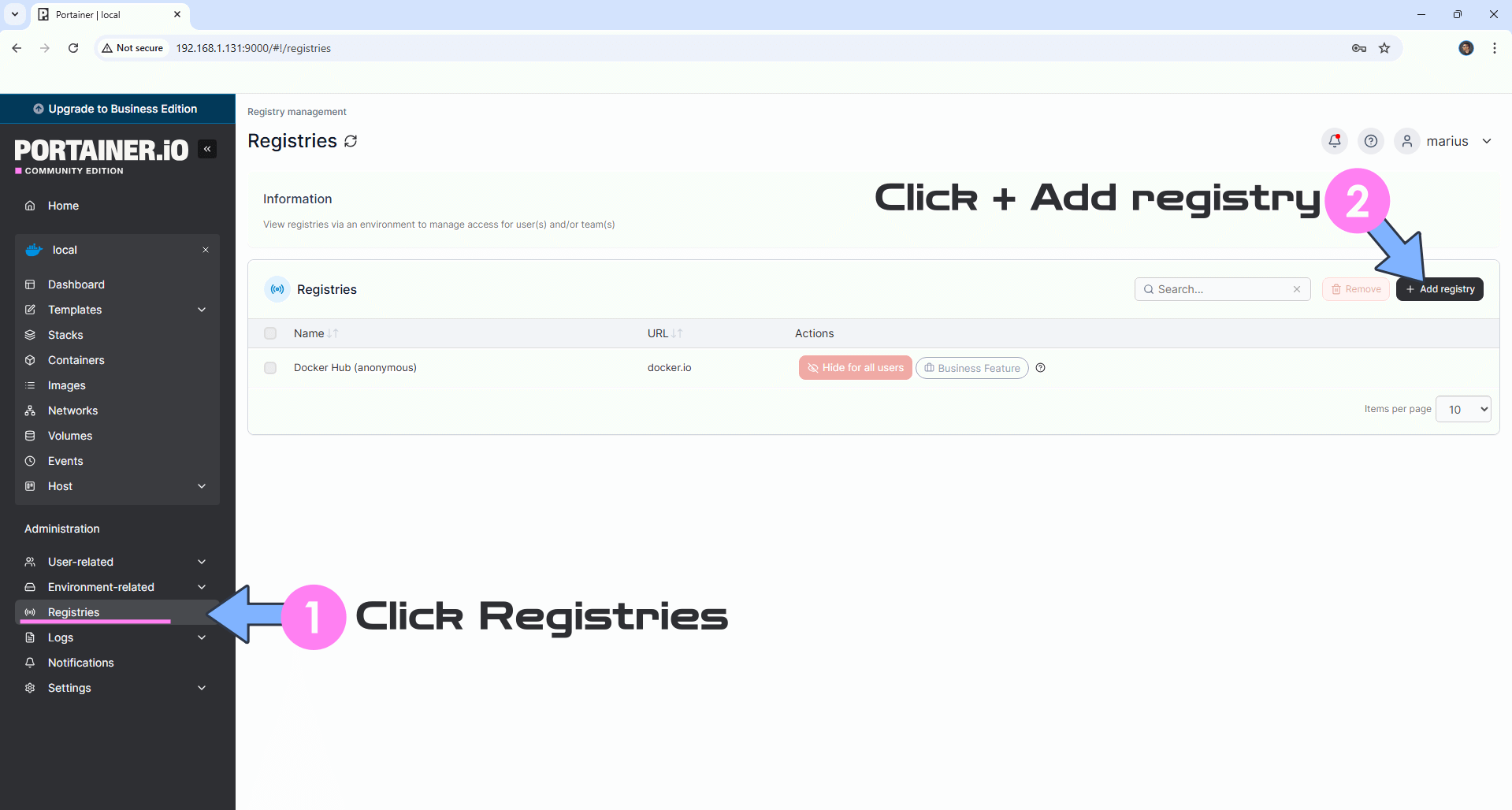
STEP 17
Click on Custom registry. In the Name field area type in Github and in the Registry URL area type in ghcr.io
Click Add registry to save the settings. Follow the instructions in the image below.
Note: The ghcr.io registry is mandatory if you want to update Docker containers via Portainer that are served via the Github registry.
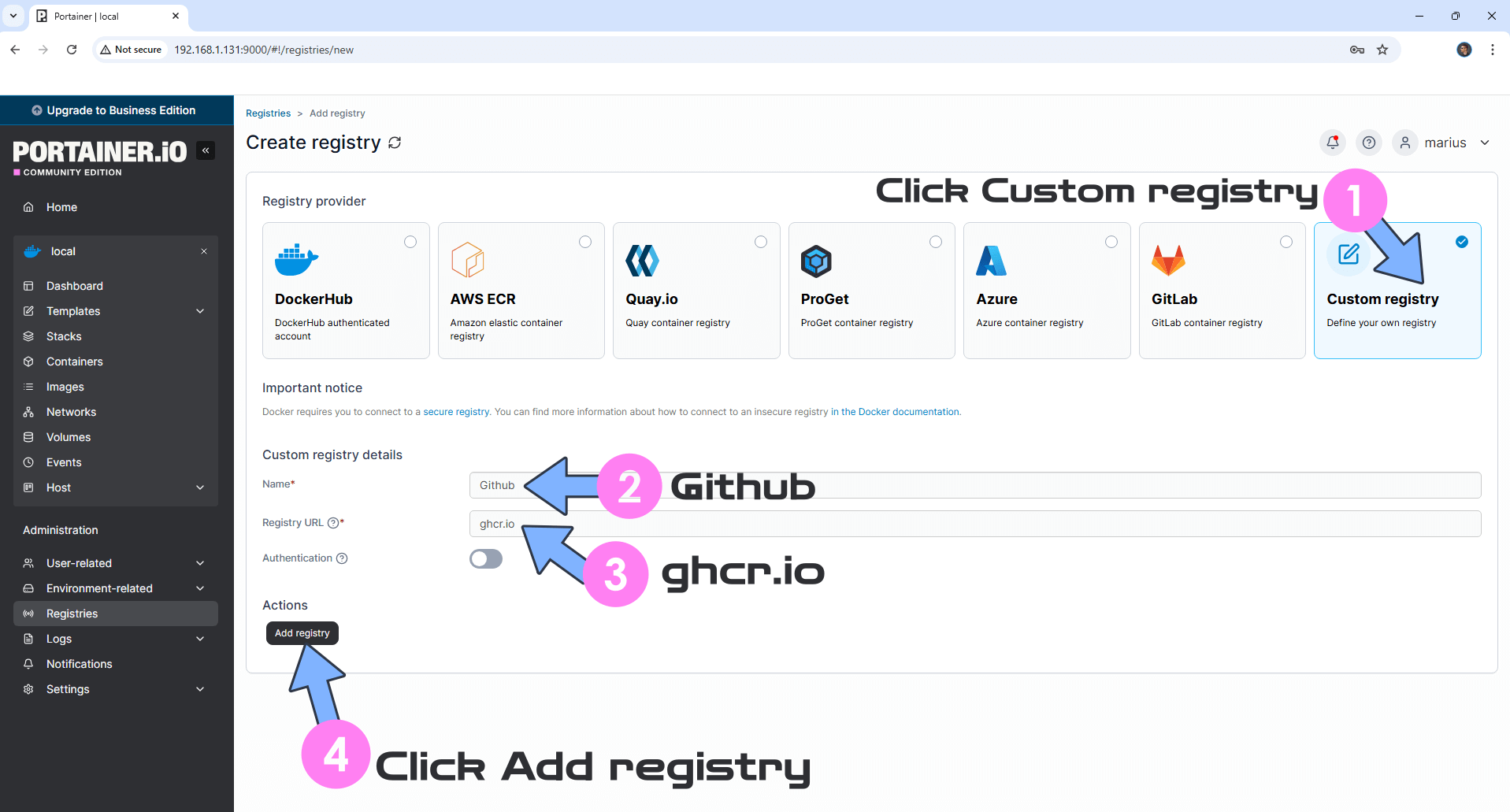
Click on +Add registry then Custom registry. In the Name field area type in CODEBERG and in the Registry URL area type in codeberg.org
Click Add registry to save the settings. Follow the instructions in the image below.
Note: The codeberg.org registry is mandatory if you want to update Docker containers via Portainer that are served via the codeberg.org registry.
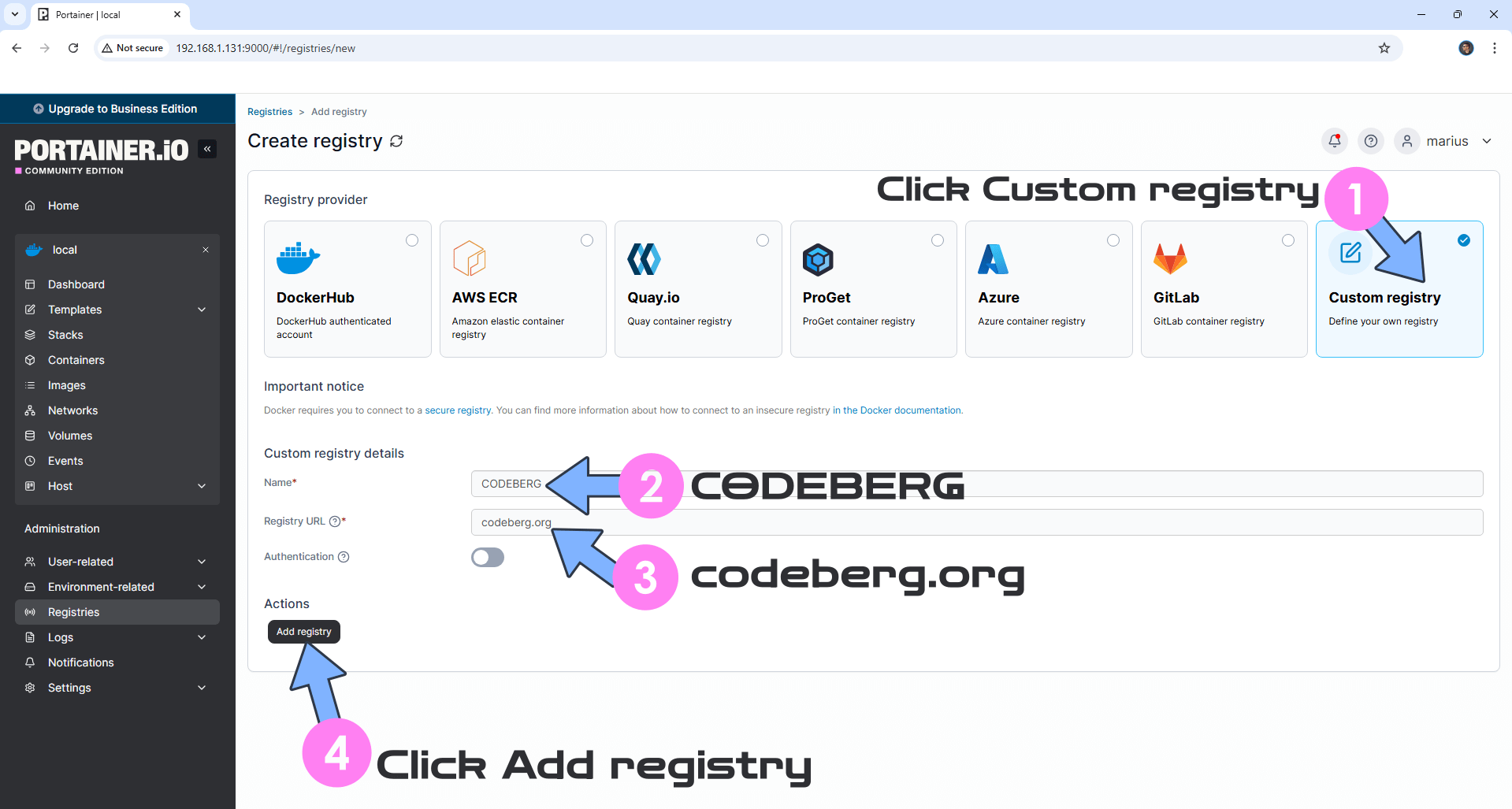
Click on +Add registry then Custom registry. In the Name field area type in Quay.io and in the Registry URL area type in quay.io
Click Add registry to save the settings. Follow the instructions in the image below.
Note: The quay.io registry is mandatory if you want to update Docker containers via Portainer that are served via the quay.io registry.
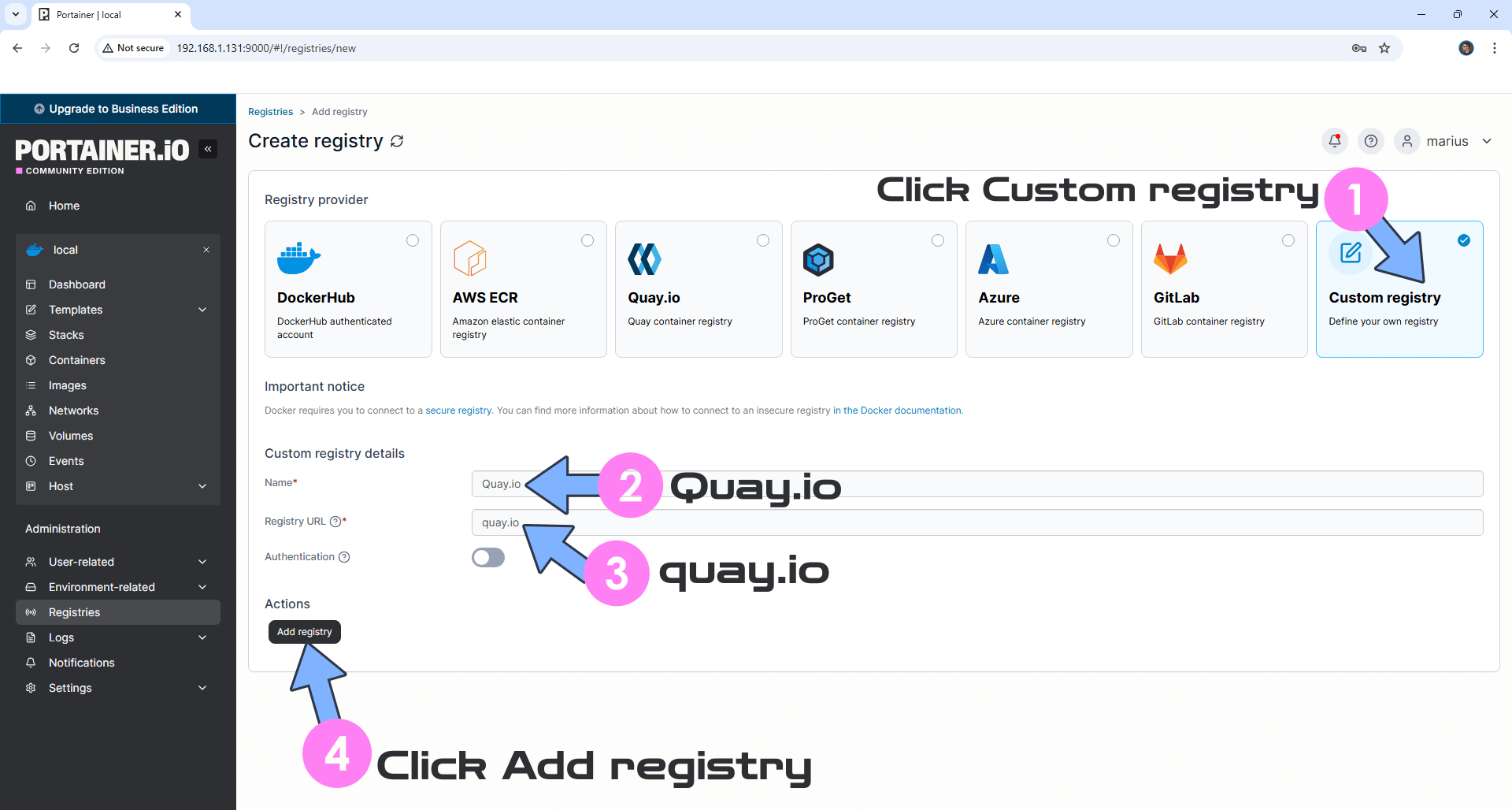
STEP 18
If everything goes right, your Registries area will look like this. Go straight to the next STEP.
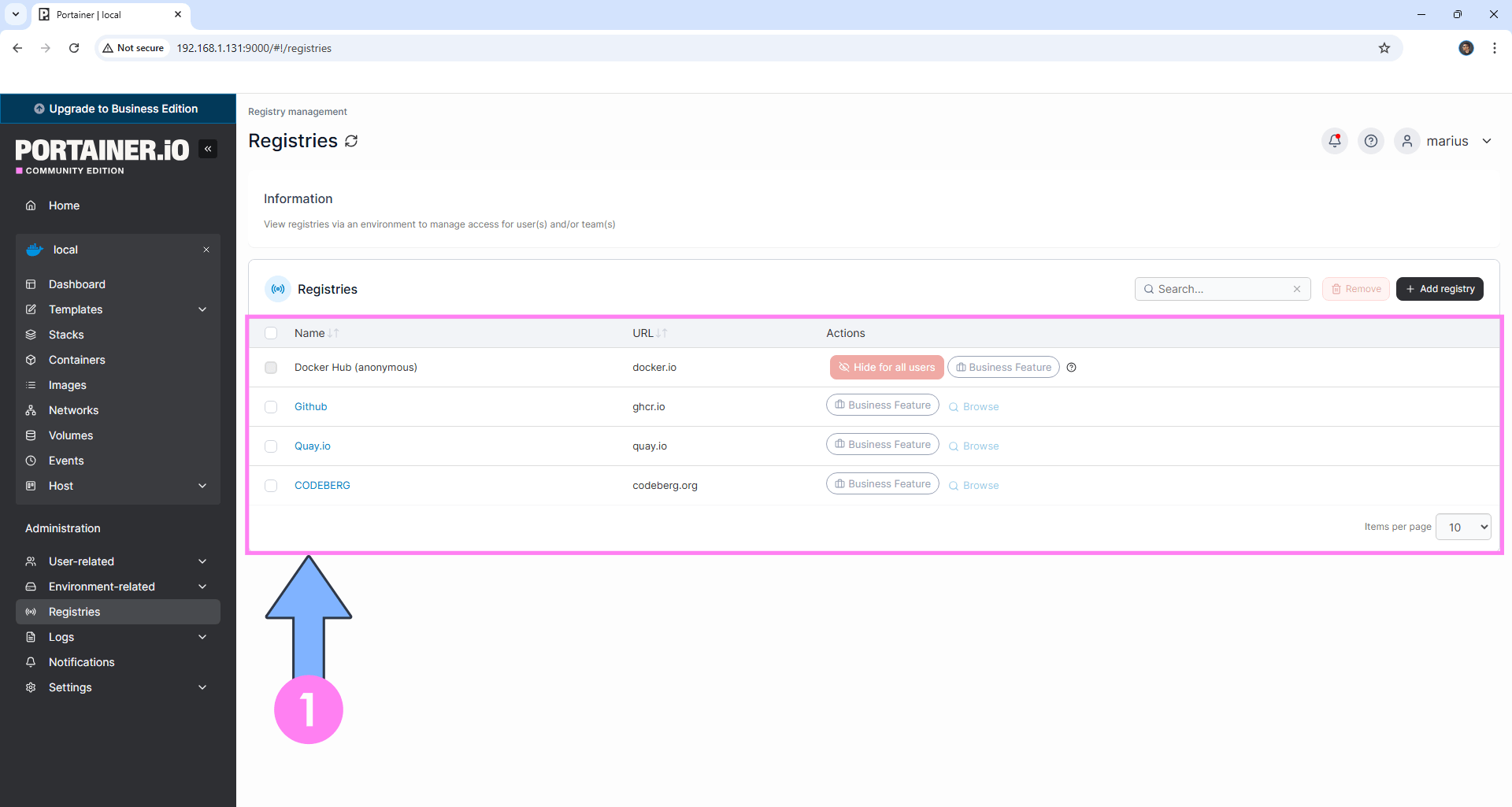
STEP 19
Follow the steps below to remove the blue attention seeker “Upgrade to Business Edition” button.
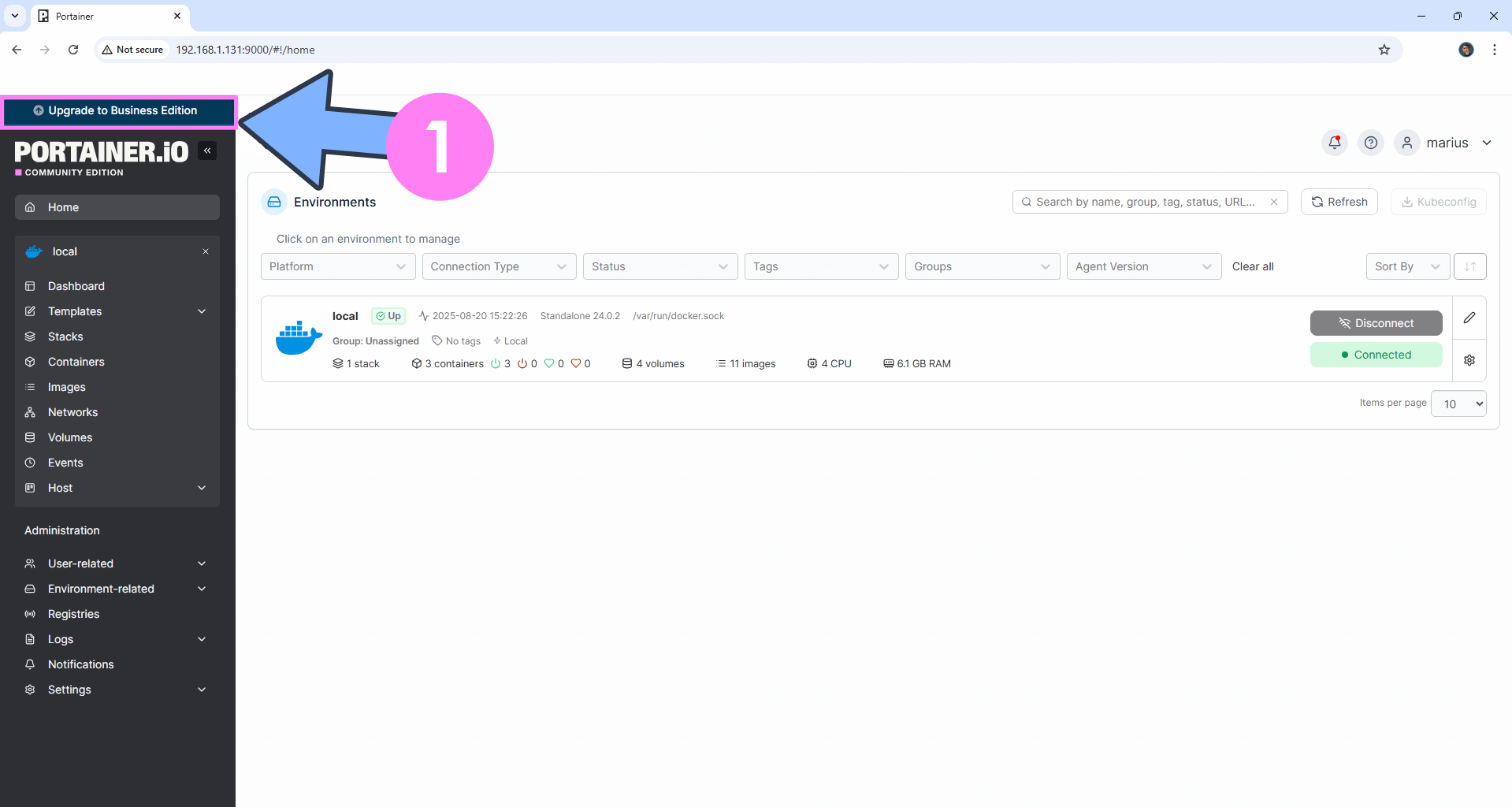
Download (click on the blue link below) the adBlocker extension for Chrome. Click to Add to Chrome. Follow the instructions in the image below.
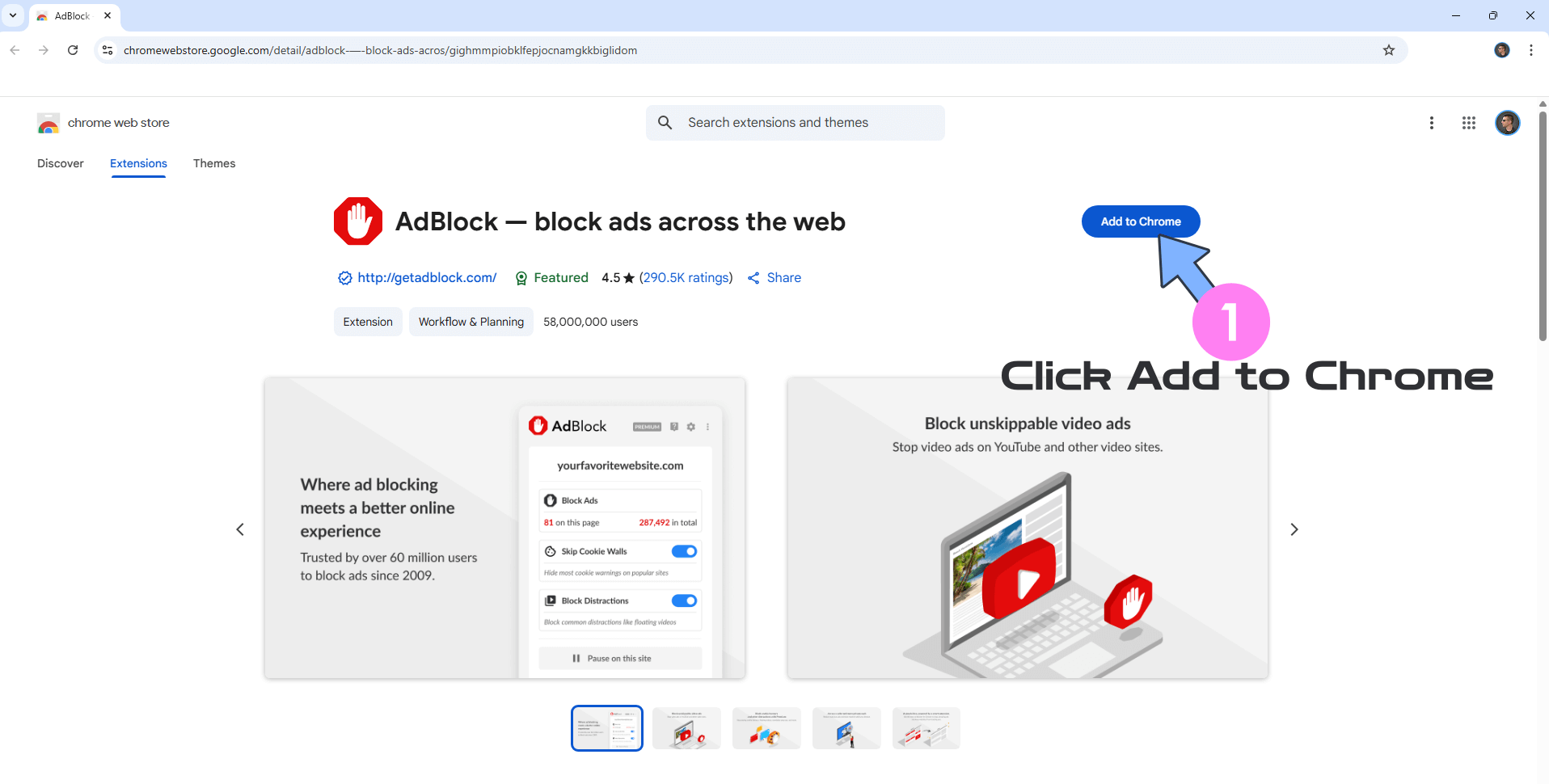
Click Add extension. Follow the instructions in the image below.
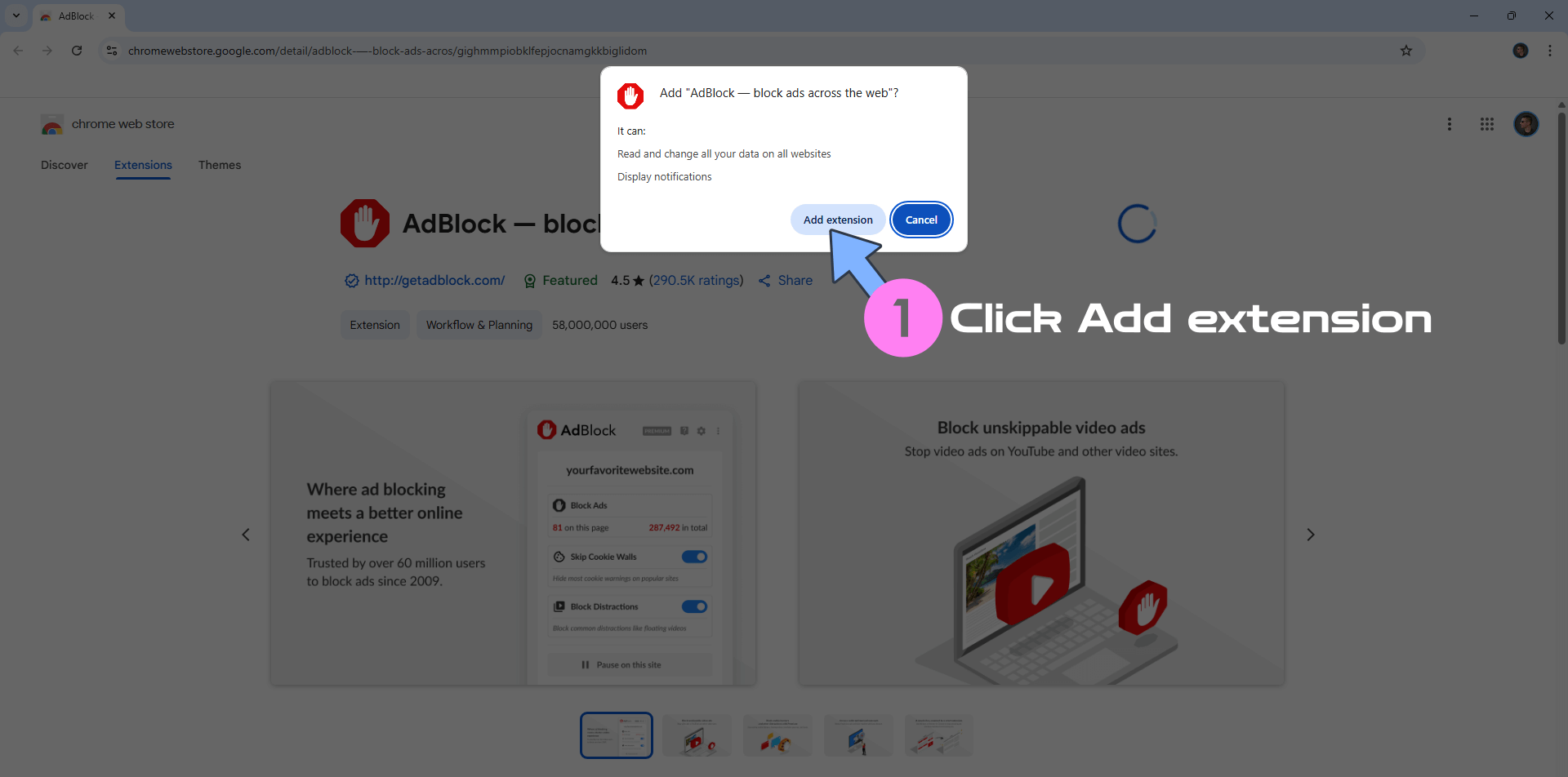
STEP 20
Go Back to your Portainer page. Right click on the blue “Upgrade to Business Edition” button. Select AdBlock then Block this ad. Follow the instructions in the image below.
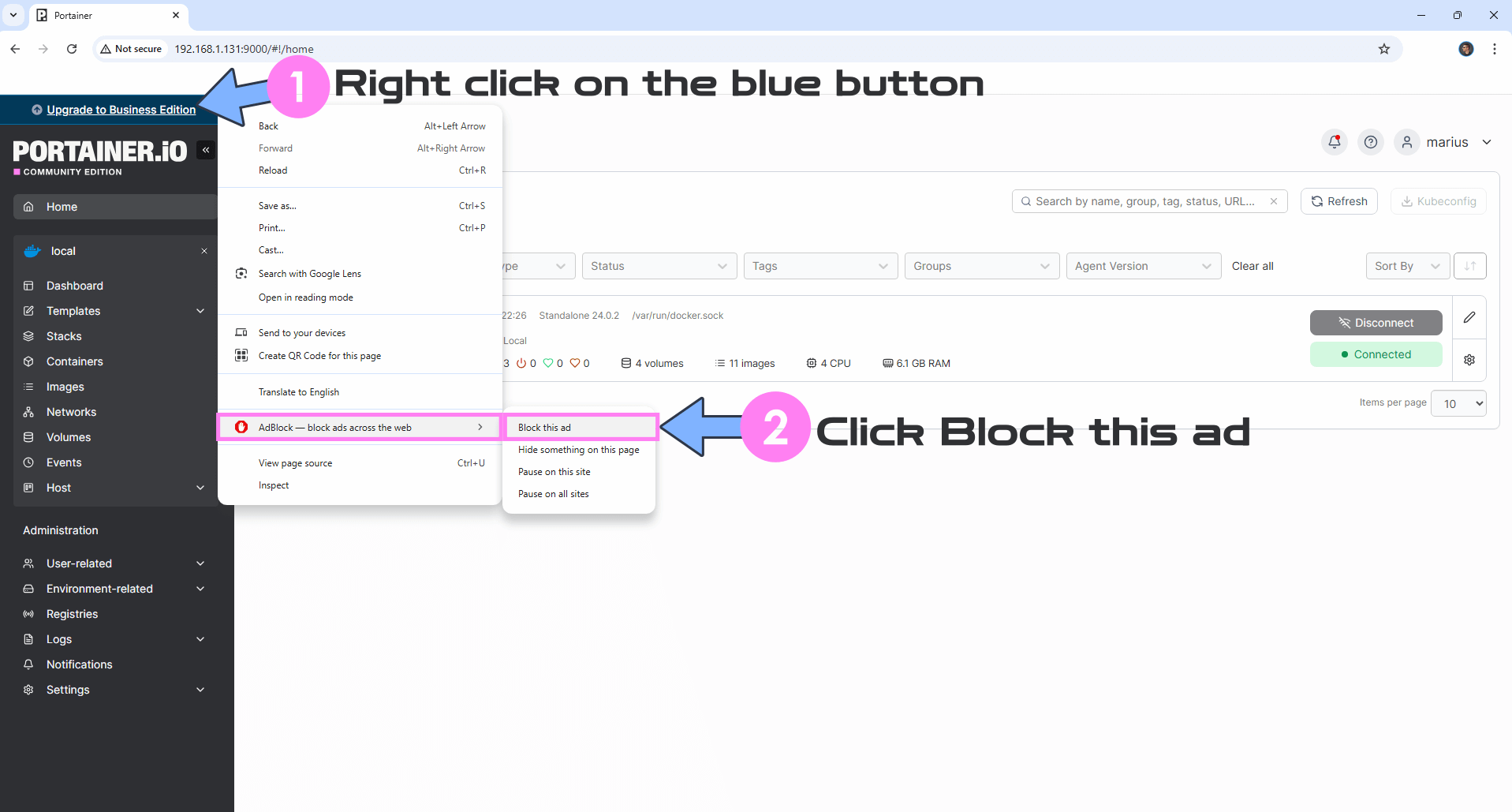
STEP 21
Click Looks good. Follow the instructions in the image below.
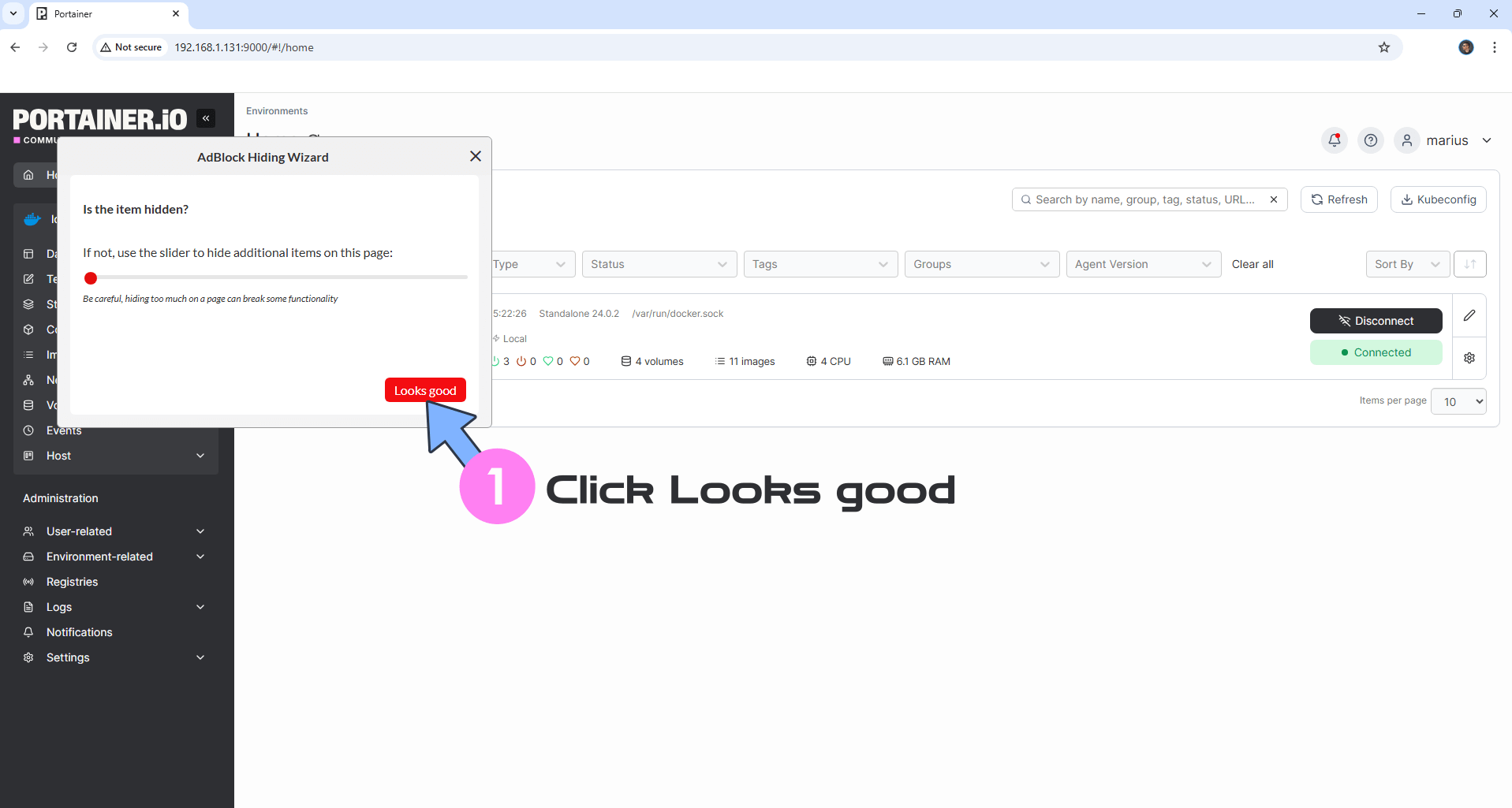
Click Confirm. Follow the instructions in the image below.
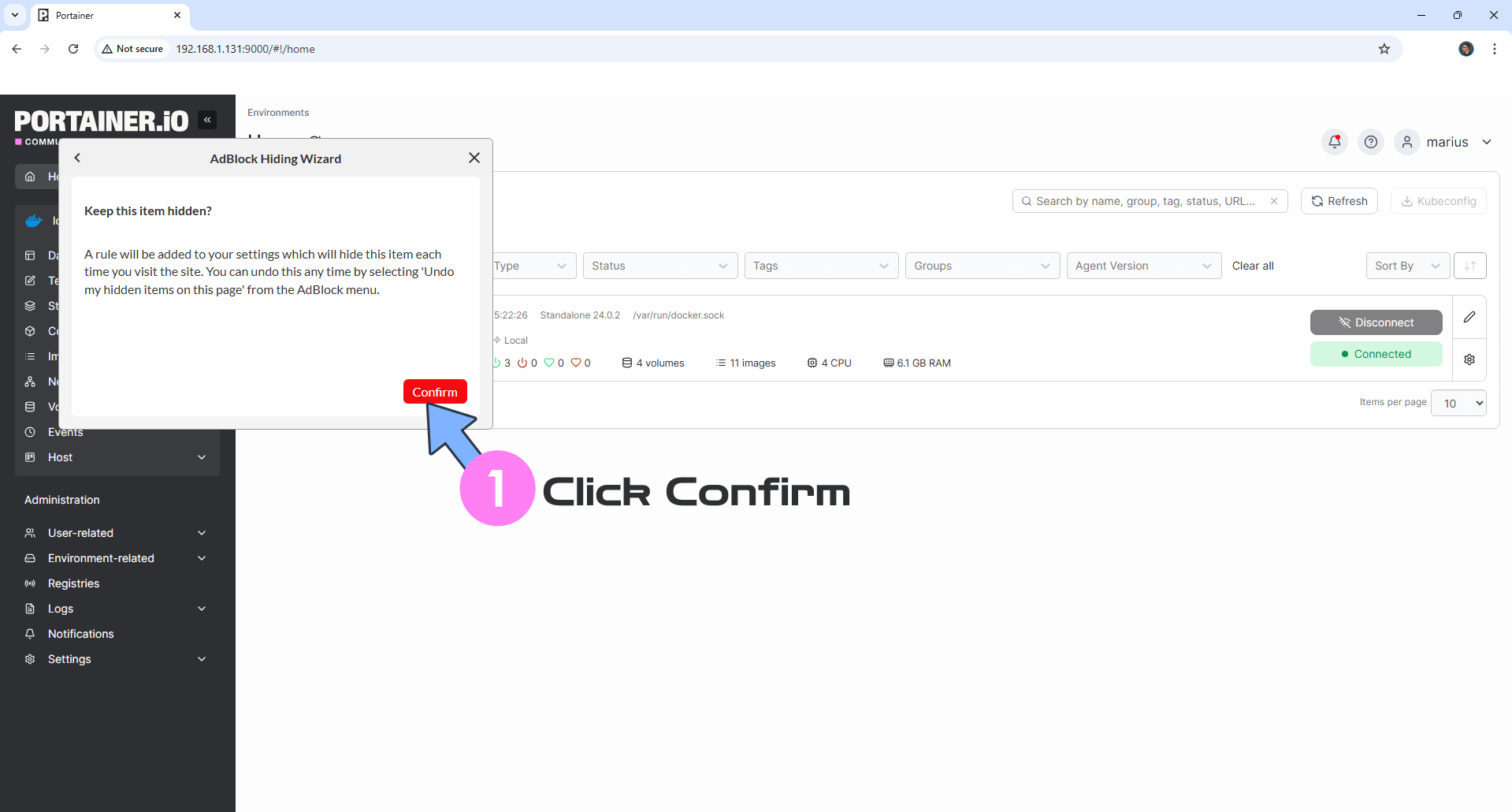
Enjoy your Portainer without the blue attention seeker “Upgrade to Business Edition” button.
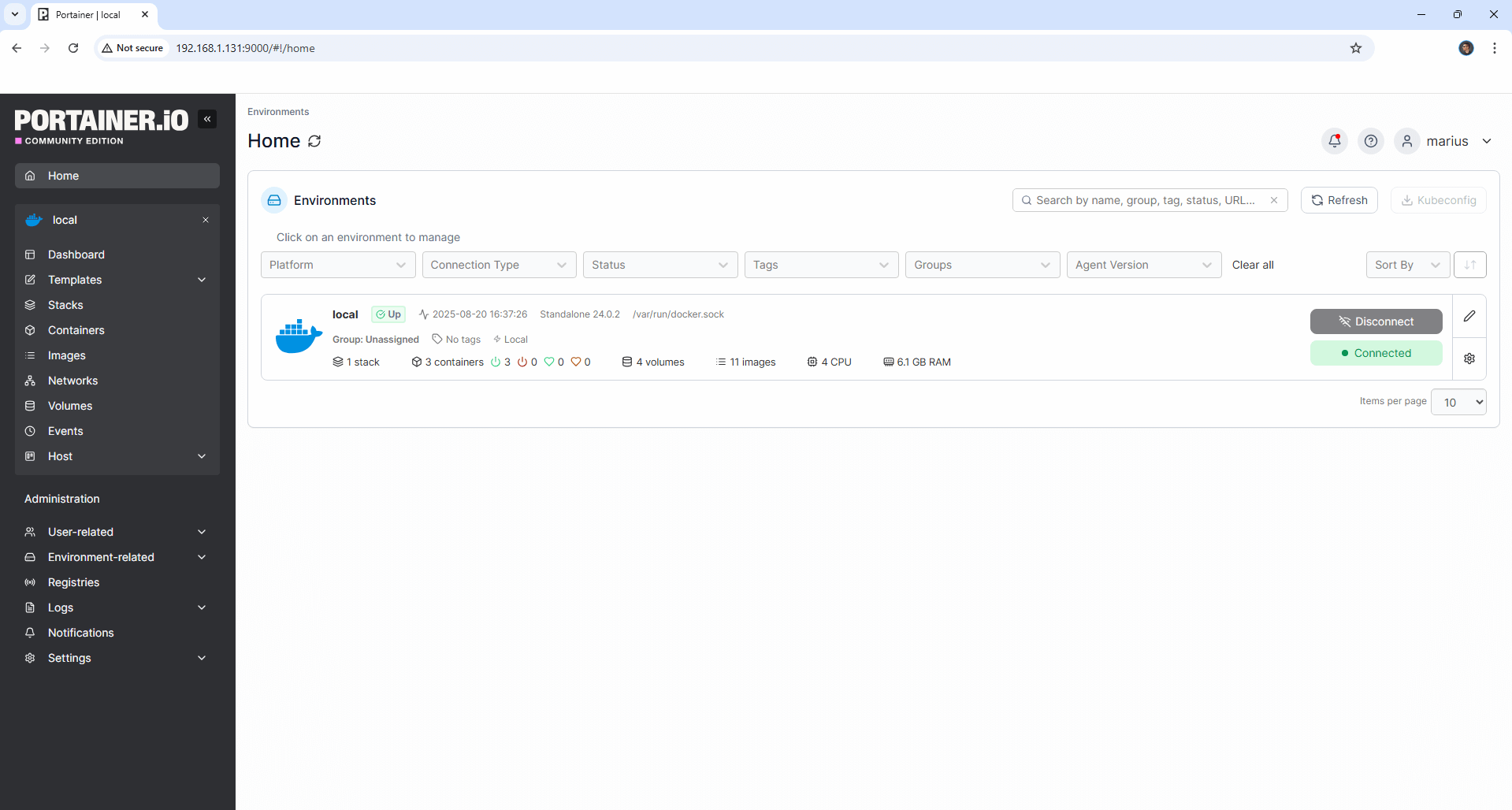
Enjoy Portainer!
If you encounter issues by using this container, make sure to check out the Common Docker issues article.
Note: If you want to run Portainer over HTTPS, check out my article How to Run Docker Containers Over HTTPS. In order to make Portainer work via HTTPS, it’s mandatory to activate WebSocket. ⚠️Note: If you are using a reverse proxy with Portainer, ensure you add the TRUSTED_ORIGINS environment variable to the code at STEP 5, as shown in the example below.
docker run -d --name=portainer \
-p 8000:8000 \
-p 9000:9000 \
-v /var/run/docker.sock:/var/run/docker.sock \
-v /volume1/docker/portainer:/data \
-e TRUSTED_ORIGINS=portainer.yourname.synology.me \
--restart=always \
portainer/portainer-ce- Open Container Manager.
- On the left sidebar in Container Manager, click Container.
- Select the portainer container, then click the Action tab and Stop it.
- Select the portainer container, then click the Action tab, then Delete.
- On the left sidebar in Container Manager, click Image.
- Select the portainer/portainer-ce image, then click the delete tab to delete it.
- Go to Control Panel. Click Task Scheduler. Select and Run the “Install Portainer” task with the new code above that includes TRUSTED_ORIGINS with your own domain name.
- Enjoy the latest Portainer!
- Warning: Do NOT delete the portainer folder in File Station.
Note: If you use a different volume than volume1, for example volume2, you need to change the following line at STEP 5
-v /volume1/docker/portainer:/data \
with
-v /volume2/docker/portainer:/data \
Note: How to Backup Portainer.
Note: Find out how to update the Portainer container with the latest image.
Note: How to Reset Portainer Password.
Note: How to Back Up Docker Containers on your Synology NAS.
Note: How to Change Portainer Logo With Your Own Logo.
Note: How to Activate Dark Mode in Portainer.
Note: Can I run Docker on my Synology NAS? See the supported models.
Note: How to Free Disk Space on Your NAS if You Run Docker.
Note: How to Schedule Start & Stop For Docker Containers.
Note: How to Activate Email Notifications.
Note: How to Add Access Control Profile on Your NAS.
Note: How to Change Docker Containers Restart Policy.
Note: How to Use Docker Containers With VPN.
Note: Convert Docker Run Into Docker Compose.
Note: How to Clean Docker.
Note: How to Clean Docker Automatically.
Note: Best Practices When Using Docker and DDNS.
Note: Some Docker Containers Need WebSocket.
Note: Find out the Best NAS Models For Docker.
Note: Activate Gmail SMTP For Docker Containers.
Note: CE stands for Community Edition.
This post was updated on Tuesday / February 10th, 2026 at 11:06 AM
